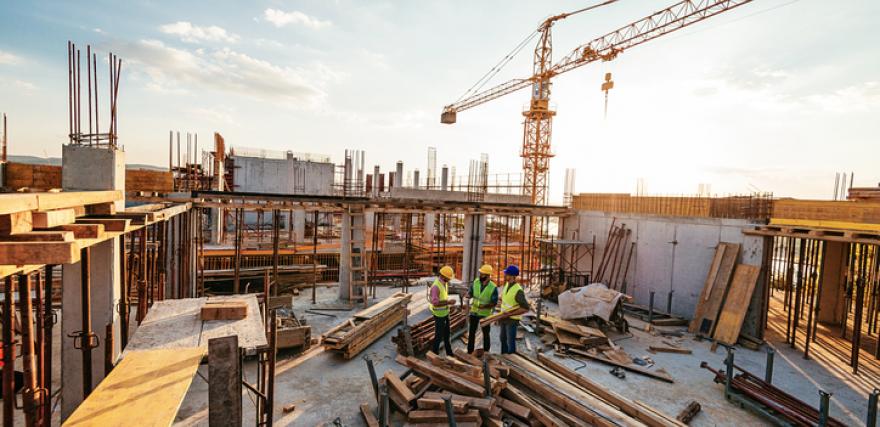
Increasingly, U.S. construction companies are focusing on improving safety through evaluating processes, analyzing data and quickly responding to incidents with actionable information. In Ausust, DPR Construction announced a partnership with HammerTech to standardize safety processes across all their U.S. projects. This partnership is enabling DPR to improve operations and save lives.
In this interview, we talk with HammerTech Co-founder and Executive Vice President Bradley Tabone and DPR Regional Safety Manager Joe Garza about the partnership, its benefits and why safety is becoming a greater focus for U.S. construction companies.
How can technology improve on-site safety in the construction industry?
Bradley: There are several different technologies that will have a large effect on industry safety, including single-platform digitalization, drones and sensors, virtual reality, robotics, and modular design and construction.
These and other technologies can improve safety by eliminating or reducing the chance that people can be injured by gathering data that can be analyzed for process improvement and bettering the way training is delivered. Those looking to implement new technology must make sure that tools work together and there’s a clear strategy.
The biggest changes in safety will come from creating standardized digital processes, monitoring and tracking work, and analyzing data for process improvement. Investing in a platform that allows for standardization as well as collaboration is the first step to implementing new technology.
The shift to safer job sites is not a one-step process. I recommend creating a three- to five-year plan and then determining the right technology to achieve maximum results from each phase. Tech doesn’t solve problems; people do. Tech just makes things easier.
How do you see technology changing the construction industry in the U.S.?
Bradley: There is far greater focus and attention to job site safety than ever before in the U.S. It’s a paradigm shift that has been needed for a long time. Safety used to be thought of as inspections of incidents and injury management to be implemented in reaction to an accident. We believe that safety needs to be integrated into operations throughout the construction process from the beginning.
Taking a platform approach, we think safety is more than digital documents. It’s about grabbing the key information and data, allowing that information to flow into other crucial processes, digitally connecting all key collaborators, and connecting safe practices to every aspect of the job site.
Here’s how it can work. Using the right technology, incidents can be investigated and underlying causes analyzed in days instead of weeks or months. For example, a worker was injured on a job site when a pipe split. The accident was captured in HammerTech, which automatically recorded the details as well as the insurance information before the start of the investigation.
The root-cause analysis the same day as the injury found that piping corners weren’t assessed appropriately. Further review of historic and current job sites discovered that a specific model had a greater failure rate. The client updated the prestart inspection checklist the same day as the injury and pushed the new processes to all job sites nationally. Workers received a warning about the specific model and how to fix the problem in real time, with no delays in disseminating the information.
Joe, what challenges prompted you and the DPR team to look for an enterprise solution focused on safety?
Joe: DPR’s mission is to be one of the most admired companies by 2030. One way to do that is to become the safest contractor in the industry. We want to eliminate all injuries and incidents associated with construction, but we still have work to do.
If we’re going to eliminate every injury, we have to get ahead of them. We needed a tool that would help us identify the leading indicators that matter most, so we can better focus our energy and resources.
What were the must-haves for this system?
Joe: DPR believes that our people are the most important part of our safety culture. Together, our employees are dedicated to creating an injury-free environment and eliminating risks and behaviors that lead to injury. We needed a system for metrics and analytics that is predictable and actionable.
What importance did you place on software implementation prior to HammerTech and has the rollout nationally changed that view? What best practices can you share?
Joe: Software is just another tool we want to leverage. We need it to work for us rather than bog us down. It has to be analytical and the interface needs to be engaging, with metrics that help us cut straight to the issue.
Over the past decade, we’ve tested many applications. Some have moved outside of the trial phase and were adopted by a business or a region, but none has scaled to an enterprise level. What we’ve learned so far is to go slow, communicate often and work across the company. It’s important to engage stakeholders and end users early in the process.
Where do you see the partnership between HammerTech and DPR in a year? Five years? What changes are you planning to make to your business through this implementation?
Joe: We started working together in early 2017 and the goal is to use HammerTech on every DPR project worldwide, which we should be able to achieve early next year. We want to have the data available to make critical business decisions and decrease the incident rate across businesses.
In five years, I hope that the partnership will be stronger than ever. At that point, I think we will have learned a lot from each other that HammerTech can apply to the broader construction industry. DPR is a global leader in construction and thought leadership on safety. It’s exciting to think what this partnership can produce for the overall industry when you combine this record with HammerTech’s global reach, safety experience and product offering.



Comments are closed